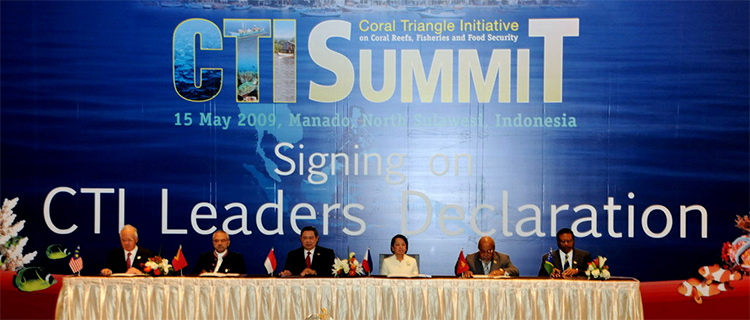
Institutional entrepreneurs
Triangle cooperation
How ecosystem-based management emerged in The Coral Triangle
The Coral Triangle is a unique marine area located in the western Pacific Ocean and has been labelled "the underwater equivalent of the Amazon" for its staggering diversity of corals and associated flora and fauna.
More than 120 million people live in the Coral Triangle and rely on its coral reefs for food, income, protection from storms and a number of other ecosystem services. In 2007 the Coral Triangle Initiative (CTI) was formed as a multilateral partnership of six countries to address the urgent threats facing these unique coastal and marine ecosystems.
Beyond national borders
In a recent article published in Marine Policy, centre researchers Franciska von Heland and Per Olsson have investigated the role of so-called "institutional entrepreneurs" in the emergence of the CTI. Such entrepreneurs are "individuals and groups of individuals who leverage resources to create new institutions or transforming existing ones".
"While research has addressed the role of institutional entrepreneurs at the local and national level, few studies have explored their role in the emergence of integrated approaches for natural resources management internationally," explains von Heland.
Building trust
von Heland and Olsson paint a fascinating picture of the dynamic process leading up to the establishment of the CTI. It includes the Indonesian president, a series of international conferences, NGOs, donor agencies, informal networking, trust building, lobbying and diplomacy. They all interacted over a period which can be divided into four different phases. The transition from one phase to another was enabled by certain key events.
Phase one introduced the new idea of the CTI to the highest political level by drawing on formal and informal networks. It was followed by a second phase focused on mobilizing funds and support, in collaboration with President Yudhoyono who officially initiated the partnership. In phase three the preparing for the first high-level meeting between the six countries was given central attention.
This included conceptualizing what the CTI could look like and preparing drafts of central steering documents. This proved to be key to succeed in the fourth phase where the deal was sealed during a whole series of multilateral and national meetings, arranged to develop legal and financial arrangements necessary to implement the initiative.
Interviews conducted in six countries
The analysis behind the new article is based on a large number of qualitative interviews conducted in Thailand, the Philippines, Indonesia, and Australia between August and October 2010.
Meeting protocols from various CTI events, followed by snowball sampling (initial informants help to recruit future informants), were used to identify individuals central to the emergence and adoption of the CTI. Interviews were done with informants from national governments in the Coral Triangle, donor agencies, NGOs and academia.
Ten key entrepreneurs
The many interviews revealed that a small network of approximately ten institutional entrepreneurs was key to initiate the process. They developed the scientific concept of the CTI into an integrated framework for marine governance.
This framework not only requires the six states to multiply their cooperation and carry out far-reaching institutional reforms, but also a mind shift — viewing ecosystem-based management and marine conservation not primarily as a cost, but rather as an investment in sustainable economic development and national security.
These ten entrepreneurs came from both inside and outside the region and predominantly, but not solely, from conservation NGOs with a long history of working with marine conservation.
They all had extensive experience in dealing with resource challenges or with bringing governments and non-state actors together for better marine conservation. Moreover, it was revealed that all of them had advisory or managerial positions in their organizations, meaning that they could get access to financial resources and use already existing local to global networks to scaleup their ideas.
"Institutional entrepreneurs can only succeed by interacting with other forms of leadership, such as the strategic leadership of the Indonesian President Yudhoyono or the orchestrated action of donor agencies and international NGOs," Per Olsson explains.
Linking biodiversity and security
On another level the process of developing the CTI has been triggered by a number of underlying driving forces, including demands for social and economic development, concerns about political stability and national security, and rapid loss of biodiversity — particularly commercially important species.
Together these factors seem to have opened a window of opportunity for the new institutional arrangements for ecosystem-based management and regional cooperation to emerge.
"Institutional entrepreneurs played a crucial role by aligning factors and showing the interconnectedness between social and ecological goals", Franciska von Heland says.
In particular, it seems like the support from the six countries for the CTI is based on the initiative's connection to a range of security concerns, revolving around things like food crises, economic deprivation, terrorism and illegal fishing.
In conclusion, the new article in Marine Policy emphasises that institutional entrepreneurs must both understand and develop strategies to link security issues, environmental change, and ecosystem-based management. At least this was key to the success to leverage support and resources to create new institutions and transforming existing ones in the emergence of the Coral Triangle Initiative (CTI).
See interview with Per Olsson on why key individuals are important for organisational change:
References
Rosen F., Olsson P. Institutional entrepreneurs, global networks, and the emergence of international institutions for ecosystem-based management: The Coral....Mar. Policy (2012), http://dx.doi.org/10.1016/j.
marpol.2012.05.036
Franciska (Fanny) von Heland is a PhD student affiliated with the centre. Her primary interest at the Stockholm Resilience Centre is within knowledge management, learning and social networks.
Per Olsson's primary research interest is in linked social-ecological system dynamics and resilience. He has worked extensively in the field of ecosystems management and also has eight years of field work in Sweden, Belize and Australia.






